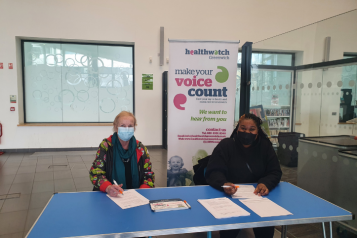South East London Healthwatch Insights

SOUTH EAST LONDON HEALTHWATCH QUARTERLY INSIGHT REPORTS
SEL Healthwatch Q3 Insight Report (October to December 2024)
This report sheds light on the various health services individuals discussed with south east London Healthwatch between January and March 2024. The feedback is sourced by SELHW from calls, emails, meetings, online reviews, outreach, and engagement events.
We have gathered valuable insights from individuals across south east London regarding their experiences with health services. By actively listening to the voices of the community, we have gained a better understanding of their perspectives and the challenges they encounter when accessing healthcare. Listening to feedback from various segments of the community is a top priority for SELHW. This helps us understand the complete picture and provide valuable feedback to service providers, enabling improvement. From October to December 2024, SELHW actively engaged with over 2,490 people. These engagements included groups that are typically underrepresented, such as: residents from Black, Asian, and minority ethnic backgrounds, residents living with disabilities or long-term conditions, residents with additional linguistic needs, residents residing in the 20% most deprived areas.
Healthwatch Insight Report SEL Q2 (November 2024)
The South East London Healthwatch Q2 Insight Report for November 2024, based on feedback from over 3,000 residents, highlights key issues in accessing healthcare services. Long waiting times for surgery, GP appointments, and hospital referrals were common, with reports of patients in Lewisham waiting two years for autism assessments for children or surgeries. Access issues included 8am phone queues for GP appointments and difficulties booking online, particularly for the elderly. Positive examples included a prompt GP call-back system in Lewisham, the X-Pert Health diabetes course in Bexley, and Bromley’s mental health services. However, communication gaps, such as lack of updates on hospital waiting lists and issues with aftercare information following discharge, were reported as concerns. Despite these issues, many praised the professionalism of staff, and initiatives like Southwark’s NHS Vital 5 Health Van and local ambassador programmes were well-received, showcasing the potential for impactful community engagement.
Healthwatch Insight Report SEL Q4 (May 2024)
This report summarises Healthwatch reports from January to March 2024 focusing on common issues in health services, such as challenges people face in maternity care, hospital discharge and ophthalmology services.
Communication and trust emerged as critical themes, emphasising respectful interactions between healthcare professionals and patients. Culturally sensitive practices especially for minority groups and those with communication challenges are crucial. The report highlights barriers to equitable healthcare access, including long wait times and language barriers. The report also highlights the need to improve access to mental health services to reduce stigma and improve outcomes.
Healthwatch Insight Report SEL Q3 (February 2024)
Between October and December 2023, SELHW conducted extensive engagement with over 3000 individuals, including ethnic minorities, residents with disabilities, and LGBTQ+ individuals, to gather diverse perspectives on health services and on patients, their families and carers’ experiences.
The report shows varied feedback across services, highlighting positive experiences with dental care and community pharmacies, while identifying significant concerns related to access, communication issues, and administrative processes within GP and hospital services. Key challenges identified include prolonged waiting times, communication difficulties, and obstacles to access posed by digital platforms.
Healthwatch Insight Report SEL Q2 (November 2023)
This Insight Report details significant community engagement efforts by SEL Healthwatch, with 13,047 people sharing their health and social care experiences and 24,207 people seeking advice. Over 2022-2023, Healthwatch published 76 reports, utilising 273 volunteers who contributed 974 days to collect experiences from community members.
The report focuses on seldom-heard communities, addressing issues in maternity care, mental health services, primary care access, and digital inclusivity. Feedback from July to September 2023, gathered from 3,585 people, highlighted the necessity of community input for service improvement. People highlighted positive experiences with the professionalism and attitudes of staff in healthcare settings but identified concerns with appointment availability, waiting times, and service hours.
Healthwatch Insight Report SEL Q3 (October-December 2022)
The Southeast London Healthwatch Quarterly Insight Report (Oct-Dec 2022) highlights feedback from people and communities on health and social care services.
Key issues identified include difficulty accessing NHS dental services and GP appointments, with some residents resorting to private care due to long waiting times. Mixed reviews were received regarding hospital care, with praise for staff dedication but concerns over lengthy waiting times. Mental health services were also identified as a need with delays in accessing mental health care raised as an issue.
Healthwatch Insight Report SEL Q2 (April-June 2022)
The Southeast London (SEL) Healthwatch Quarterly Insight report for April to June 2022 presents feedback from people and communities in Bexley, Bromley, Greenwich, Lambeth, Lewisham, and Southwark. Key issues include people’s experiences in accessing dental and GP services and highlights significant difficulties for minoritised communities and children. Pharmacy services faced criticism for staff attitudes and service inefficiencies. Hospital concerns centred on long waiting times, especially in A&E. Healthwatch saw increased calls about mental health services. The report also highlighted issues with vaccine status recording on the NHS app and challenges faced by housebound individuals to get COVID 19 booster vaccinations.
Healthwatch Insight Report SEL Q1 (April-June 2022)
The Southeast London (SEL) Healthwatch Quarterly Insight Report for Q1 2022-2023 provides an overview of feedback received by Healthwatch about health and social care services from April to June 2022. The report highlights experiences of dentistry, pharmacy, GP, hospital, maternity, paediatric, and mental health services.
Key issues include difficulties accessing NHS dental care, unsatisfactory attitudes of some pharmacy and GP staff, long waiting times in hospitals, inadequate pain relief during childbirth, and insufficient mental health support. The report also highlights challenges in updating vaccine status and the need to improve services for people with autism and learning disabilities.
SOUTH EAST LONDON HEALTHWATCH REPORTS
For all reports produced by local Healthwatch, please see the National Reports Library. Reports for each Healthwatch can be found using the Local Healthwatch drop-down menu.
